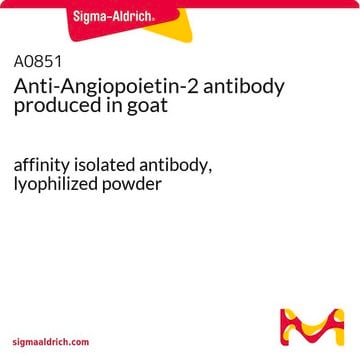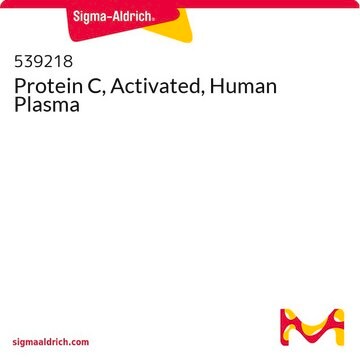A0604
Monoclonal Anti-Angiopoietin-1 antibody produced in mouse
clone 171718, purified immunoglobulin
Sinónimos:
Anti-ANG-1
About This Item
Productos recomendados
biological source
mouse
Quality Level
conjugate
unconjugated
antibody form
purified immunoglobulin
antibody product type
primary antibodies
clone
171718, monoclonal
species reactivity
human
technique(s)
immunohistochemistry: 25 μg/mL using cells and tissue sections
indirect ELISA: 0.5-1.0 μg/mL
western blot: 1-2 μg/mL
isotype
IgG2b
UniProt accession no.
storage temp.
−20°C
target post-translational modification
unmodified
Gene Information
human ... ANGPT1(284)
General description
Immunogen
Application
Immunohistochemistry (1 paper)
Biochem/physiol Actions
Angiopoietins are growth factors vital for vascular differentiation during normal development. There are four angiopoietins discovered that bind to receptor tyrosine kinases Tie2. Angiopoietin-1 (ANG-1) is a potent pro-angiogenic factor that works by recruits mural cells for endothelial tubule formation and vessel maturation. ANG-1 acts along with VEGF in enhance angiogenesis and increase vascular branching. ANG-1 also affects the inflammatory process and inhibits the capillary transmigration of leukocytes on TNF-α stimulation. Sonic hedgehog, a secreted growth factor, reportedly upregulates the expression of ANG-1. Overexpression of angiopoietins has been observed in a variety of malignancies including neuroblastoma, glioblastoma and lung cancers. While ANG-2 increases the metastasis and angiogenesis of the tumors, ANG-1 inhibits tumor angiogenesis
Physical form
Disclaimer
¿No encuentra el producto adecuado?
Pruebe nuestro Herramienta de selección de productos.
Optional
Storage Class
11 - Combustible Solids
wgk_germany
WGK 1
flash_point_f
Not applicable
flash_point_c
Not applicable
ppe
Eyeshields, Gloves, type N95 (US)
Certificados de análisis (COA)
Busque Certificados de análisis (COA) introduciendo el número de lote del producto. Los números de lote se encuentran en la etiqueta del producto después de las palabras «Lot» o «Batch»
¿Ya tiene este producto?
Encuentre la documentación para los productos que ha comprado recientemente en la Biblioteca de documentos.
Nuestro equipo de científicos tiene experiencia en todas las áreas de investigación: Ciencias de la vida, Ciencia de los materiales, Síntesis química, Cromatografía, Analítica y muchas otras.
Póngase en contacto con el Servicio técnico







